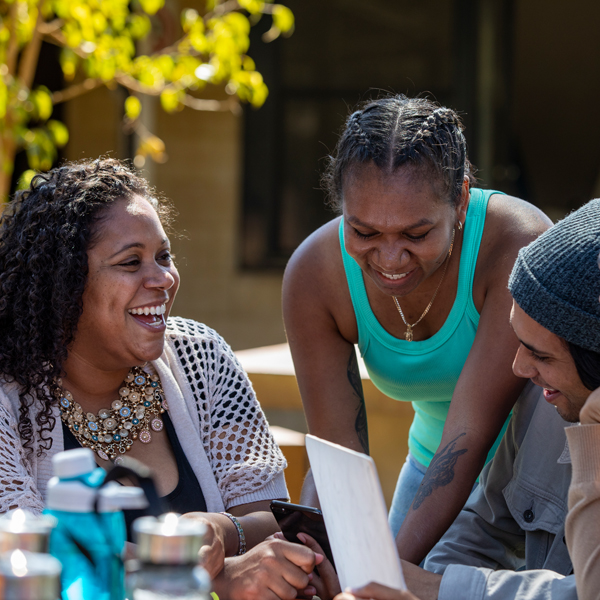Key Dates
Next Grant Round:
Applications for funding will open early 2025.
> Information about our Grants Program
Independent Grants Panel:
Results of the recent EOI will be notified Dec 2024.
> Information about our Panel
We can help: grants@accan.org.au
or phone 02 9288 4000
Subscribe to Grants Program mailings
Dr Denise Wood was recently awarded the inaugural Telstra-TJA Christopher Newell Prize for Telecommunications and Disability for her paper titled “Communicating in Virtual Worlds through an Accessible Web 2.0 Solution.”
Dr Wood, a researcher and senior lecturer in the School of Communication, International Studies and Languages at the University of South Australia, undertook the research as part of an Australian Learning and Teaching Council project to improve access to 3D virtual-learning environments and identify the benefits of Web 2.0 and 3D Virtual Worlds such as Second Life for people with disabilities.
Read more: Dr Denise Wood talks to ACCAN about Web 2.0 and 3D virtual worlds
Write comment (0 Comments)
ACCAN is committed to promoting and advancing digital inclusion, with particular focus on issues relating to the affordability and accessibility of services.
While our work on digital inclusion continues to evolve, this area of enduring policy work is aimed at supporting consumers that may face greater barriers to being digitally included. These include, but are not limited to, people with disability; regional, rural and remote consumers; First Nations Australians; and issues impacting young consumers, people from culturally and linguistically diverse backgrounds and older Australians.
Some current issues in this policy priority include the affordability of broadband services and devices; access to suitable communications in regional, rural and remote Australia and remote First Nations communities; and the accessibility of communications services and devices for people with disability.

ACCAN is committed to advancing the interests of consumers through enhancements to consumer protection arrangements. Sound consumer protections are necessary to allow consumers to engage confidently in the communications market.
ACCAN’s work and commitment to ongoing engagement with stakeholders will drive strengthened consumer protections through the direct regulation of consumer protections. Some current issues in this policy priority include the adequacy of consumer protection arrangements for financial hardship, credit assessment and domestic and family violence.

Through this priority, ACCAN will advance the interests of consumers by supporting policy settings that provide for reliable, resilient and robust infrastructure. ACCAN will continue to engage with key infrastructure policy matters, including the economic regulation and pricing of NBN and legacy communications services and infrastructure investment programs.
Key issues in this policy priority include improving the coverage, capacity and reliability of regional, rural and remote infrastructure to support consumers, small business and communities to grow and thrive.

This theme will examine the barriers to getting and staying connected for renters, people experiencing homelessness and those residing in supported accommodation, retirement villages and social, community, affordable or public housing.
Building on historic work undertaken by ACCAN this theme will focus on the development of policy proposals to improve the digital inclusion of consumers regardless of where they live.

This theme will focus on emerging issues and trends in the use of communications technologies to cause consumer harm. The intent of this theme is to identify emerging issues and support the development of forward-looking policy settings.
Building on research undertaken by ACCAN grant recipients this theme will focus on the development of policy principles and settings that limit the use of communications technologies for consumer harm, including coercive and abusive behaviour.

ACCAN is committed to advancing accessibility for all consumers. This theme will focus on progressing the Ideal Accessible Communications Roadmap in partnership with our members and the broader disability sector to deliver a fully accessible communications sector.
Executive Summary
Telecommunications sales practices must prioritise the best interests of consumers over commercial gain. The obligations in the Telecommunications Consumer Protection (TCP) Code for carriage service providers (CSPs) to ensure responsible sales are inadequate and do not provide appropriate community safeguards to communications consumers.
Executive Summary
Robust and comprehensive assessments of a consumer’s capacity to pay (credit assessments) help ensure consumers can confidently participate in markets and access products and services they can afford. The obligations in the Telecommunications Consumer Protection (TCP) Code for carriage service providers (CSPs) to conduct credit assessments are ineffective and do not provide appropriate community safeguards to communications consumers. Credit assessment obligations must be sufficiently robust to protect consumers against financial harm, while ensuring that financially capable consumers are not prevented from acquiring a service.
Summary
Telecommunications are a vital service for victim-survivors of Domestic and Family Violence (DFV), who often need assistance from their provider to retain a safe and affordable service. In contrast, communication services can also be used to facilitate DFV, which can lead to considerable consumer detriment. Current codes and guidelines do not effectively support and protect consumers or promote uniformity in the communications industry.
The Australian Communications Consumer Action Network (ACCAN) recommends the Minister for Communications implement direct regulation via a service provider determination to support consumers affected by DFV.1 Protections for consumers experiencing or at risk of DFV must be enforceable via direct regulation noting the material risks to personal safety that consumers affected by DFV may face when their access to essential communications services is disrupted or interfered with.
ACCAN’s purpose, as outlined in our Strategic Plan, is to work for “communications services that are trusted, inclusive, accessible and available for all.”
Our approach to priorities
ACCAN has revised the way in which we approach our policy priorities, in consultation with our members. Feedback from members supported a movement to setting out our enduring priorities, which reflect our long-term areas of policy focus, and more immediate proactive areas of policy focus or policy themes.
ACCAN has today released our Independent Plan Comparison Tool (IPCT) Policy Position. Developed in consultation with consumers and other stakeholders, this position outlines the rationale for an IPCT for the telecommunications sector.
The IPCT should:
